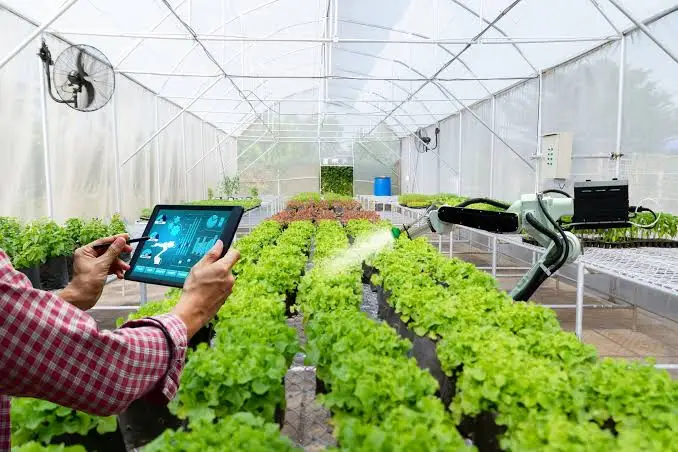The integration of Artificial Intelligence (AI) in agriculture has brought revolutionary changes to how crops are cultivated, harvested, and managed. From precision farming to automated irrigation systems, AI is driving sustainable agricultural practices that benefit the environment and, ultimately, the economy. However, like any innovation, the adoption of AI in agriculture has both its advantages and challenges. In this article, we will explore how AI contributes to agricultural sustainability and how it impacts the economy, along with the potential drawbacks that need to be addressed.
Benefits of AI in Agriculture Sustainability
- Increased Efficiency and Productivity
AI-powered tools can analyze soil data, weather patterns, and plant health, allowing farmers to optimize their use of resources such as water, fertilizers, and pesticides. This precision reduces waste and increases the yield per hectare, making farming more efficient. For instance, automated irrigation systems ensure crops receive the right amount of water, saving valuable resources and reducing costs. - Reduction in Environmental Impact
One of the primary goals of sustainable agriculture is to minimize environmental harm. AI helps in reducing the overuse of harmful chemicals by analyzing the precise needs of crops. With tools like drone monitoring and sensor data, AI can detect pest infestations or diseases early, limiting the need for blanket pesticide applications, which can harm ecosystems and biodiversity. - Cost Reduction for Farmers
With AI, farmers can reduce operational costs through predictive analytics, automation, and data-driven decision-making. For instance, autonomous tractors and AI-powered harvesting machines reduce labor costs, which are often a significant expense. AI can also forecast weather more accurately, helping farmers plan ahead and avoid losses due to unexpected climate events. - Improved Food Security
AI allows farmers to increase yields, predict crop failures, and reduce food waste through advanced supply chain management. This not only benefits local economies but also contributes to global food security, which is especially important as the global population continues to grow. - Data-Driven Decision Making
AI tools collect and analyze vast amounts of data from fields, including soil health, moisture levels, and pest presence. This data helps farmers make informed decisions about planting, fertilizing, and harvesting crops. By relying on AI-driven insights, farmers can ensure more sustainable farming practices that not only boost productivity but also preserve soil health for future generations.
Economic Impact of AI in Agriculture
- Job Creation in New Sectors
While AI automation reduces the need for traditional farming roles, it creates new job opportunities in tech and agricultural innovation. Positions in AI development, equipment manufacturing, data analysis, and farm management are in growing demand, leading to an overall increase in employment in related sectors. - Boost to Agricultural Exports
Countries that adopt AI-driven sustainable agriculture can increase their crop production, leading to higher export potential. This benefits national economies by generating more revenue from global markets. Additionally, AI can help develop high-quality crops that meet international standards, enhancing a country’s competitive edge. - Greater Investment in Agri-Tech Startups
As AI continues to transform agriculture, there has been a surge in investment in agri-tech startups. These companies are developing innovative AI tools and platforms that help farmers optimize their operations. Increased investment not only stimulates economic growth but also encourages the development of new technologies that further advance sustainability.
Drawbacks of AI in Agriculture Sustainability
- High Initial Costs
One of the primary barriers to adopting AI in agriculture is the high initial cost of implementing these technologies. Many small-scale farmers, especially in developing countries, cannot afford the advanced tools and systems needed to take full advantage of AI. This could widen the gap between large, tech-savvy farms and smaller, traditional ones. - Loss of Traditional Farming Jobs
While AI creates new roles in technology and data management, it also reduces the need for manual labor on farms. Automation can lead to job displacement for workers who rely on traditional farming practices. This is a significant concern, especially in regions where agriculture is a primary source of employment. - Data Privacy and Security Concerns
As more farmers use AI, large amounts of data are collected on soil conditions, crop yields, and farming practices. The question of who owns this data and how it is used is a growing concern. Farmers may find themselves at a disadvantage if big companies control and monopolize agricultural data, which could limit their independence. - Technology Dependency
Relying heavily on AI tools could make farmers vulnerable to technology failures, hacking, or system malfunctions. If AI systems break down or experience errors, entire crops could be compromised, leading to significant financial losses. Furthermore, over-dependence on AI might also reduce farmers’ traditional knowledge and problem-solving skills. - Digital Divide
The integration of AI requires a high level of digital literacy and access to reliable internet infrastructure. Many rural areas, particularly in developing countries, lack these resources, making it challenging for small farmers to adopt AI technologies. This digital divide can further exacerbate inequalities in agricultural production and income.
Conclusion
AI is transforming agriculture by promoting sustainable practices that boost productivity, reduce environmental impact, and strengthen the economy. However, the high costs of implementation, potential job losses, and concerns over data privacy are challenges that need to be addressed to ensure that the benefits of AI in agriculture are distributed equitably. By finding a balance between technology and traditional farming practices, AI has the potential to make agriculture more sustainable while supporting economic growth.
As the world grapples with the challenges of climate change, resource scarcity, and food security, the role of AI in agriculture will only become more critical. Sustainable AI-powered agriculture could offer a path toward a greener, more productive, and resilient future for the global economy.


I believe this website has some rattling excellent information for everyone :D. “Calamity is the test of integrity.” by Samuel Richardson.